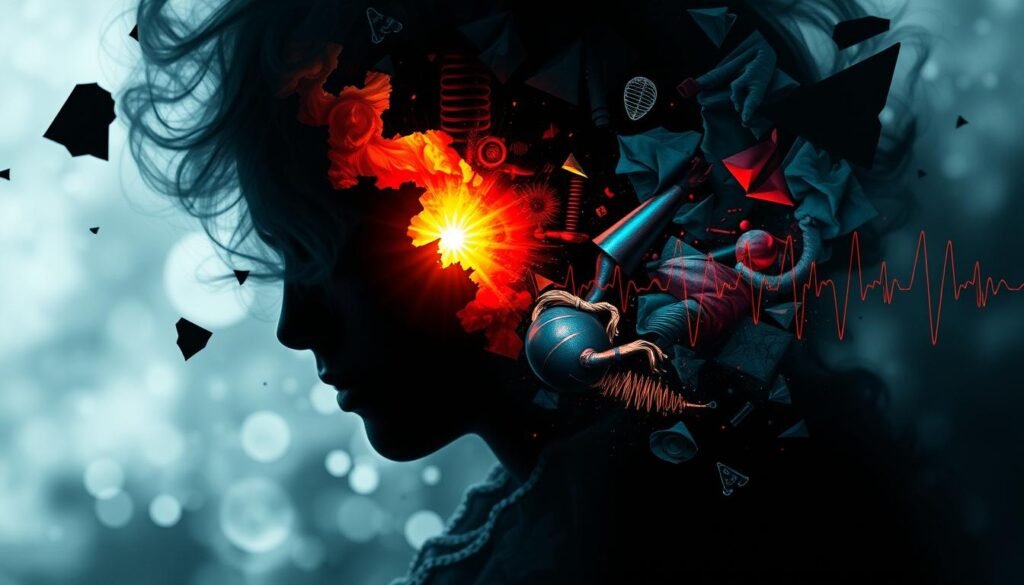Anxiety impacts around 40 million adults in the U.S. every year. It shows just how widespread this condition is. Anxiety attacks bring sudden, intense fear or panic. While some anxiety is normal, persistent anxiety might hint at deeper mental health concerns. Recognizing what causes anxiety attacks and their symptoms is crucial for dealing with them effectively.
These episodes can affect both your mind and body, sometimes leading to lasting issues. Getting the right professional help is key. This might include therapy, like Cognitive Behavioral Therapy (CBT), or medication. Tackling them early with proper mental health support can greatly help. For deep dives, visit this resource.
Understanding anxiety attacks is vital for improving mental health. It’s the first step towards finding the right treatment. Also, knowing that about 5% of people may face anxiety disorders that disrupt daily life highlights the importance of support and awareness for those affected.
Key Takeaways
- Anxiety affects approximately 40 million adults annually in the U.S.
- Cognitive Behavioral Therapy (CBT) is effective for managing anxiety disorders.
- Persistent anxiety can indicate underlying mental health issues.
- Recognizing symptoms early on can lead to better management and prevention.
- Various treatment options are available, including medications and counseling.
- Understanding one’s anxiety disorder aids in coping strategies.
- Environmental and genetic factors play significant roles in anxiety disorders.
Understanding Anxiety Attacks
Anxiety attacks come on suddenly and can leave someone feeling terrified. They happen without warning. Often, stress, lack of sleep, or big changes in life can set them off. They are different from the ongoing worry that can linger for a long time. Anxiety attacks hit hard and fast. This makes them very hard to handle. How often they happen and how bad they feel can change from person to person.
A fast heartbeat, trouble breathing, and a fear of disaster are common signs. Someone having an anxiety attack might think they need emergency help. While they aren’t dangerous, they are linked to other mental health issues. For example, panic disorder and social anxiety disorder are two of them. Such conditions can make things harder for the person.
It’s key to know what anxiety attacks are like to understand their effect. Many people are scared they will have another attack. This fear can change how they live. They might avoid places where they feel exposed. This fear can make them feel alone and upset. Over time, this could make their mental health worse.
Talking to a mental health expert can help someone understand their anxiety better. This can lead to finding ways to deal with it. Knowing more can help people face their anxiety in a better way. This can improve how they feel overall.
What Exactly Are Anxiety Attacks? Causes
Anxiety attacks involve sudden fear and worry. They can hit you out of nowhere. Stress, events, or changes in life can trigger them. It’s crucial to understand what they really are. This helps tell them apart from conditions like panic attacks.
Defining Anxiety Attacks
Anxiety attacks bring intense worry and fear. Symptoms include a fast heartbeat, sweating, and thoughts that race. They can get worse because of stress or health issues. Recognizing them is the first step to finding the right treatment for anxiety.
Difference Between Anxiety Attacks and Panic Attacks
It’s important to know how anxiety and panic attacks differ. Anxiety attacks grow slowly and link to specific worries. But panic attacks come on fast, without warning. Panic attacks have signs like heart racing and dizziness. They can make you feel out of control. This knowledge can help find the best treatment for anxiety.

| Feature | Anxiety Attacks | Panic Attacks |
|---|---|---|
| Onset | Gradual; linked to identifiable stressors | Sudden; may occur unexpectedly |
| Duration | Can last for hours | Peaks within 10 minutes |
| Fear Level | General worry and fear | Intense fear of losing control or dying |
| Common Symptoms | Worry, restlessness, heart rate changes | Fear, terror, physical symptoms (e.g., chest pain) |
Knowing these differences helps in understanding anxiety attacks better. It encourages people to get the right help. Understanding these points leads to better ways to cope. It also makes finding the right treatment easier.
Common Symptoms of Anxiety Attacks
It’s very important to know the symptoms of anxiety attacks. They can affect you physically, emotionally, and in your thinking. Knowing them early helps you handle them better.
Physical Symptoms
Physical symptoms of anxiety attacks include many things. These can be:
- Rapid heart rate
- Shortness of breath
- Trembling or shaking
- Chest pain or discomfort
- Feeling dizzy or lightheaded
- Gastrointestinal distress
- Cold sweats or hot flashes
- Tingling sensations, particularly in fingers and toes
These symptoms often start quickly, peak in 10 to 20 minutes, and may last an hour. Knowing them helps in dealing with anxiety faster.
Emotional and Cognitive Symptoms
Emotional symptoms are also key in anxiety attacks. People may feel:
- Intense feelings of fear or dread
- A sense of unreality or detachment
- Overwhelming distress
- Fear of losing control or “going crazy”
- Feelings of impending doom
Cognitive symptoms may include trouble focusing, fast thoughts, or constant worry. It’s important to understand how emotions and thoughts work together during an anxiety attack.
To manage anxiety attacks, using coping strategies is vital. Mindfulness, breathing exercises, and staying active help lessen the symptoms. For more tips, check out this website for useful information.
| Symptom Type | Examples |
|---|---|
| Physical Symptoms | Rapid heart rate, shortness of breath, chest pain |
| Emotional Symptoms | Feelings of fear, sense of unreality, impending doom |
| Cognitive Symptoms | Difficulties concentrating, racing thoughts, persistent worry |
Anxiety Disorder Symptoms
Anxiety disorders include many conditions. Each one has different symptoms that affect daily life a lot. This includes generalized anxiety disorder and panic disorder.
Generalized Anxiety Disorder
Generalized anxiety disorder (GAD) is worrying too much for at least six months. People with GAD may feel restless, tired, and have trouble focusing.
They might also get easily annoyed, feel their muscles are tight, and have sleep problems. It’s important to notice these signs early. This helps people get the treatment they need quickly.
Panic Disorder and Related Conditions
Panic disorder leads to sudden panic attacks. These attacks bring intense fear and physical symptoms. For a diagnosis, these attacks must happen more than once over time.
There are other conditions similar to panic disorder, like:
- Agoraphobia
- Social anxiety disorder
- Specific phobias
It’s crucial to understand different anxiety symptoms for the right treatment. Treatment can include talking to a therapist or taking medicine. This helps with handling these disorders better.

| Disorder | Symptoms | Percentage of Adults Affected |
|---|---|---|
| Generalized Anxiety Disorder | Excessive worry, fatigue, difficulty concentrating | 2.9% |
| Panic Disorder | Recurrent panic attacks, rapid heartbeat, sweating | 2% – 3% |
| Social Anxiety Disorder | Fear of being judged, blushing, difficulty making eye contact | 7% |
| Agoraphobia | Fear of situations where escape may be difficult | 1 – 1.7% |
Causes of Anxiety Attacks
The causes of anxiety attacks are complex. They come from both your surroundings and your genes. Knowing these factors can help people find out their triggers and get the right help.
Environmental Factors
What happens around us greatly impacts the chance of having anxiety attacks. Stressful events like losing someone close, getting fired, or big life shifts can raise anxiety levels. Lifestyle choices, such as using drugs or not getting enough sleep, also make an anxiety attack more likely. Being constantly stressed, like having trouble with friends or too much workload, can harm us too. These things are key in why anxiety attacks happen and can cause a lot of emotional and physical pain.
Genetic Predispositions
Genes also play a role in anxiety attacks. Studies show that about 25% of people with anxiety have a close family member with the disorder too. This family link means genes are important in understanding anxiety. Disorders like panic attacks are more common in some families, showing the importance of knowing our family health history. By realizing our genetic risk, we can look for mental health help that suits us early on.
| Factor Type | Description | Examples |
|---|---|---|
| Environmental Factors | External pressures that can trigger anxiety. | Stressful life events, substance abuse, chronic stress. |
| Genetic Predispositions | Inherited traits that may contribute to anxiety disorders. | Family history of anxiety, specific genetic markers. |
Panic Attack Triggers and High-Risk Situations
Panic attack triggers can happen at any time, more so during stressful events. This includes public speaking or big life changes. Knowing about anxiety helps us figure out what causes these overwhelming moments. People often have panic attacks in places they know, but find stressful. This can make them want to stay away in the future.
High-risk situations may include:
- Traveling to new or crowded places
- Experiencing major life events, such as divorce or the birth of a child
- Dealing with the death or serious illness of a loved one
- Participating in high-pressure activities, like exams or presentations
- Encounters with past traumatic events
It’s important to note how family history affects panic disorder. If your family has a history of panic attacks, you might be more likely to have them too. Also, smoking and too much caffeine can increase the risk.
Knowing what triggers panic attacks helps us get ready to face them. By handling our anxiety better, we can avoid feeling too stressed out. If you want to learn more, check out understanding anxiety for helpful information.

Effective Stress Management Techniques
Good stress management techniques are key for easing anxiety symptoms. People can find many ways to cope that fit their needs. They may find special methods that work well for them, showing how crucial it is to try different things.
Coping Strategies for Reducing Symptoms
To manage stress well, people should use several important strategies. These can include:
- Maintaining an active lifestyle through regular exercise.
- Engaging in enjoyable hobbies to bring joy and relaxation.
- Practicing self-care routines to keep mental and emotional health strong.
- Avoiding bad coping habits like drinking, drug use, and staying away from others.
- Using the “4 As” – avoid, alter, accept, or adapt to stressors.
Using healthy ways can change how we respond to stress. Being flexible when facing stress makes us stronger. Learning to set boundaries and say no helps us control what happens around us and cuts down on stress.
The Role of Mindfulness and Meditation
Mindfulness and meditation are key in stopping anxiety before it starts. These practices help us pay attention to the now, easing worried thoughts. By practicing mindfulness and meditation, benefits include:
- Improving how we understand and handle our emotions.
- Making us feel more relaxed and less stressed.
- Helping us feel thankful and keeping challenges in perspective.
Sticking with these practices can greatly lower anxiety. They help us find calm and balance, which is essential for handling stress better.
Treatment Options for Anxiety Disorders
Anxiety disorders can greatly affect daily life, pushing people to find effective treatments. Many methods exist, combining therapy and medicine to improve symptoms and mental health. Working with healthcare experts helps find the best treatment path.
Cognitive Behavioral Therapy (CBT)
Cognitive behavioral therapy (CBT) is a top treatment for anxiety. It changes negative thoughts and behaviors that cause anxiety. Studies show CBT can change how we think, offering a way to better manage anxiety.
Using exposure therapy and cognitive restructuring, people face their fears and find better coping methods. This leads to stronger emotional health.
Medication for Anxiety Management
Managing anxiety with medication includes various drugs to ease symptoms. Available options are:
- Antidepressants: Doctors often prescribe SSRIs and SNRIs.
- Anti-anxiety medications: Buspirone can help those with anxiety.
- Benzodiazepines: These offer quick relief but have addiction risks.
- Beta-blockers and sedatives: They help with physical symptoms in specific situations.
Lifestyle changes are also key in dealing with anxiety. Staying active, eating well, and managing stress are crucial. Joining support groups and talking to doctors can tailor treatments to each person. All these steps can lead to lasting mental health and better handling of anxiety.
Anxiety Attack Prevention Methods
It might not be possible to stop anxiety attacks completely. However, using certain methods can greatly reduce how often they happen and their severity. Making changes to your lifestyle can help you manage your mental health better.
One key approach is to know what triggers your anxiety and manage stress. It’s important to understand what makes you stressed and how to deal with it. Techniques like deep breathing and mindfulness can help you feel calmer.
Getting enough sleep is very important for handling anxiety. Good sleep helps your emotional health and makes you feel better overall. Having a regular sleep pattern can make your mind clearer and stronger against stress. Eating well is also crucial. A good diet keeps your energy up and your mood stable.
Avoiding too much caffeine and nicotine can also help. These things can make anxiety worse. Doing regular exercise is good too, as it makes you happier by releasing endorphins.
By understanding and using these methods, you can build up your mental strength. Lifestyle changes can improve your emotional stability and well-being.
| Method | Description | Benefits |
|---|---|---|
| Deep Breathing | A relaxation technique focused on deep, slow breathing. | Reduces stress and promotes calmness. |
| Regular Exercise | Engaging in physical activity for at least 30 minutes a day. | Boosts mood and reduces anxiety symptoms. |
| Healthy Eating | Maintaining a balanced diet rich in nutrients. | Supports overall mental health and energy levels. |
| Mindfulness | Practicing mindfulness techniques, such as meditation. | Enhances self-awareness and emotional regulation. |
| Sleep Hygiene | Establishing a regular sleep schedule and environment. | Improves sleep quality, reducing anxiety symptoms. |
| Avoiding Stimulants | Limiting caffeine and nicotine intake. | Decreases anxiety levels and promotes relaxation. |
Conclusion
Anxiety attacks are a big issue, affecting about 40 million people in the U.S. It’s important to know the symptoms and what causes them. Using the right strategies can help manage these attacks. Still, it’s worrisome that few people get the help they need. This shows we need better mental health support and awareness.
Making life better for those with anxiety is possible. Techniques like mindfulness, staying active, and having a strong support network help a lot. Seeking professional advice through therapy and medicine can also make a big difference. Talking openly about mental health can encourage people to get help.
Remember, no one with anxiety has to face it by themselves. Sharing knowledge and resources builds a supportive community. This leads to greater understanding and care for mental health, benefiting everyone.